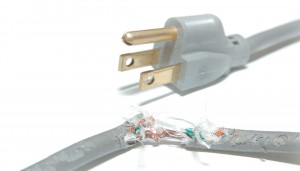 Keeping every member of your family safe around electricity is a priority of Indiana Electric Cooperatives. That includes those furry members of the family — your cat, dog, hamster or other critter.
Keeping every member of your family safe around electricity is a priority of Indiana Electric Cooperatives. That includes those furry members of the family — your cat, dog, hamster or other critter.
Once upon a time, there lived a hamster named Oliver who shared a house with his family in the suburbs.
After working out on the exercise wheel in his cage, Oliver noticed a porthole move as he brushed by in one of his tunnels of his hamster city. He turned and found he could easily rotate the door with his front paws and teeth. As he did, the entire door dropped out. He stuck out his nose into the unfamiliar surroundings and slowly wandered off into the darkness. As morning came, he found a bookcase he squeezed behind near his home and went to sleep.
That afternoon, he woke to hunger and looked around. He found a long, brown thing with a soft coating he’d never seen before. He dug his large front teeth into it. He gnawed and gnawed hoping to find a seed or other tasty morsel in the center. But all he got was hard, stringy stuff! Finally, he grew so hungry for real food that he returned to his home where he had stored sunflower seeds. As he made his way to his cage, the people who took care of him were surprised, out of the corner of their eyes, to see him on the floor. They gently placed him back in his home and screwed the door tightly into place, but Oliver didn’t mind. He was home, safe with his food, his soft bedding of saw dust and old socks, and his exercise wheel.
When evening came, Oliver’s family returned to make sure he was OK. A floor lamp stood beside Oliver’s cage. It was plugged into the outlet nearby that was operated by a wall switch at the door. When someone flicked the switch, the lamp didn’t light up as usual. Instead, the sound of hissing and arcing was heard under the bookcase, and the family smelled something burning. They quickly flicked off the switch and moved the bookcase to see what had happened. There, they found the lamp cord frayed and cut almost in two by Oliver’s teeth.
They all breathed a sigh of relief. Had the cord been electrified when Oliver bit into it, he would have been electrified, too, and dead. And, had they not immediately caught the damage, the frayed cord could have caused a fire that may have caused a lot of damage and even injury or death to the family. This hamster’s new-found freedom almost turned into a nightmare for him and his family. Oliver’s family luckily was able to use the incident to educate themselves about pets and electrical safety.
Here are some tips:
- Like young children, kittens and puppies will chew on anything they get in their mouth. Rabbits, hamsters and other small pets with constantly growing teeth will also chew on such things as electrical cords. Make sure all loose electrical wires and cords are tucked out of sight behind appliances or confined to areas where pets cannot get to them.
- Pet proof your cords when they cannot be hidden. Wrap flexible safety cable, found at hardware or computer stores, around the cords. Simple PVC piping, found at hardware stores, can also be assembled in almost any configuration and used as a tube to run appliance and computer cables and cords through.
- Keep all electrical appliances away from kitchen sinks, bathtubs, and bathroom countertops. Cats, especially, like to leap up and can knock radios, curling irons, flat irons, clocks, or other items into the water, creating a dangerous situation for you and the pet.
- If you have an aquarium, make sure all electrical cords coming from the tank have drip loops which cause any water from the tank or condensation running down the cord to fall on the floor instead of running into the outlet.
Keep yourself safe helping injured pet
If you come across a pet you believe may have suffered an electric shock, keep in mind your own safety before aiding the animal.
- Before you approach any animal which you suspect is suffering from electrical shock, take precautions to ensure there is no danger to yourself from live wires or electric fires.
- Cut off the source of electricity by either unplugging the source, or, better yet, cut the power at your circuit box.
- Any animal that has suffered electrical shock must be rushed to the veterinarian immediately, even if it may initially act OK.




